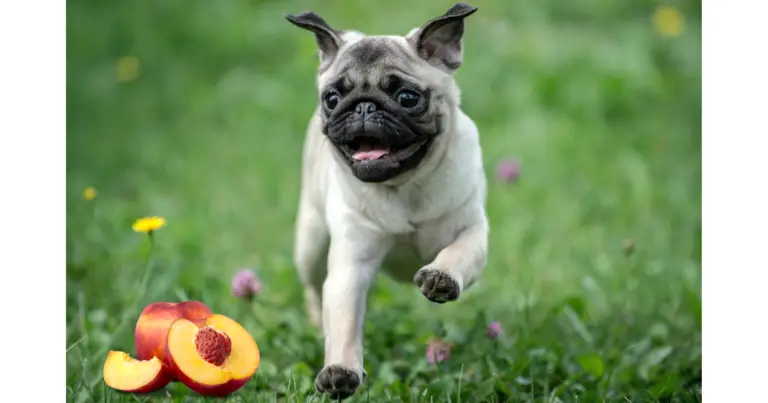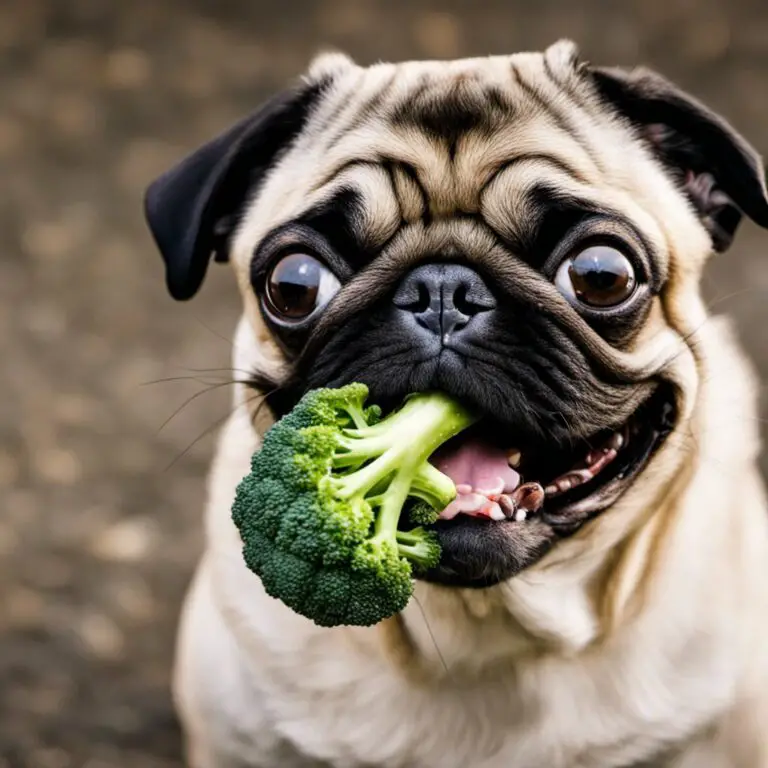Can Pugs Eat Kiwi? Expert Advice on Fruits for Dogs
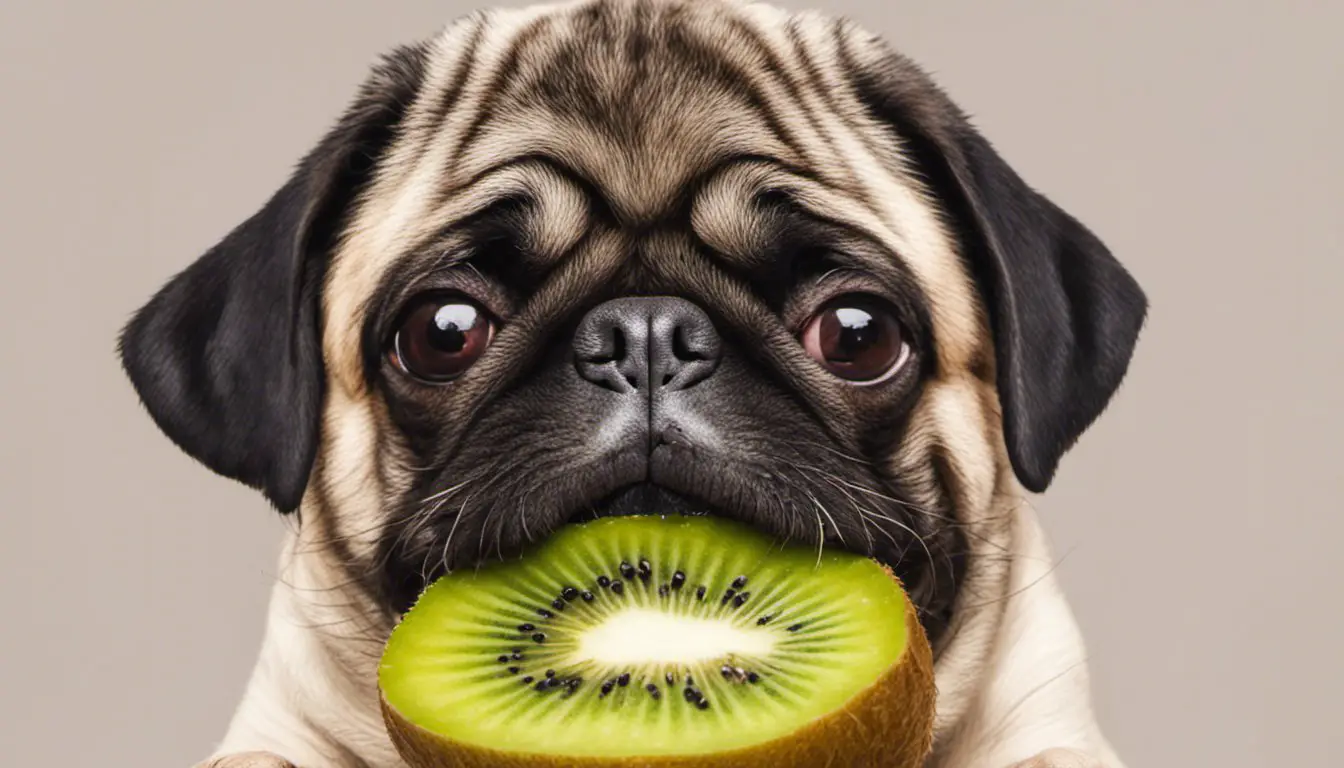
As a pug owner, you may wonder if your furry friend can enjoy the same fruits that you do. Kiwi, a refreshing and nutritious treat, might be on your list of potential snacks to share. Can Pugs Eat Kiwi? The good news is that pugs can indeed eat kiwi but with some precautions.
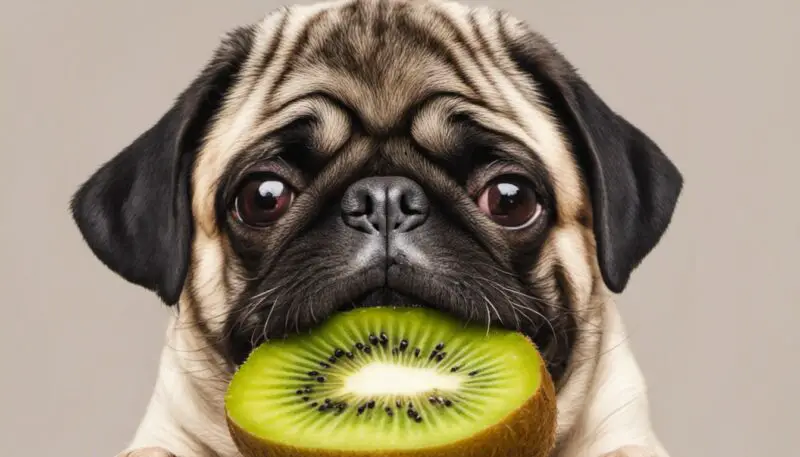
Peeled and diced kiwi can be given to pugs in small amounts, as it is not considered toxic to dogs source. However, dogs don’t have the same nutritional requirements as humans, so they may not reap all the health benefits you would from eating kiwi. That being said, it does provide some great advantages, such as vitamin C, fiber, beta-carotene, and potassium source.
When offering kiwi to your pug, remember always to remove the skin and seeds, as they can pose a choking hazard. By following these precautions and limiting the amount of kiwi you feed your pug, you can safely treat your pug to a tasty and nutritious snack.
Contents
Table of Contents
An Overview of Pugs and Their Dietary Needs
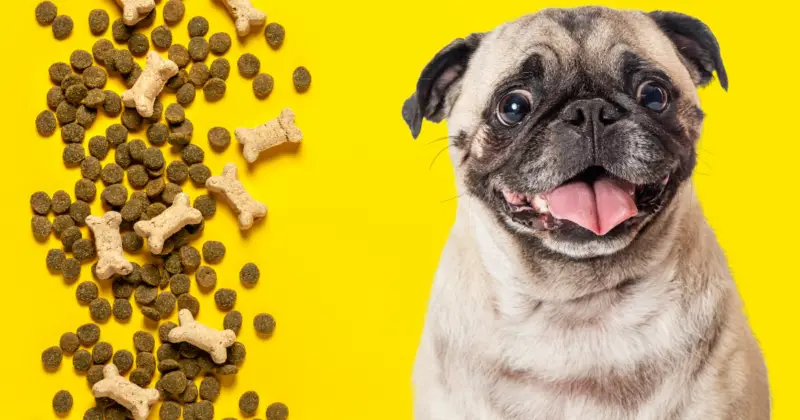
As a pug owner, it’s crucial to understand your dog’s dietary needs to keep them healthy and happy. Pugs are a small breed with specific nutritional requirements that differ from other dog breeds.
Get The Free Food Eating Guide That Keeps My Pug Happy and Playful Even at 13 Years Old
100% Beginner Friendly & Lists Real Foods Your Pug Can Actually Eat!

When planning your pug’s diet, focusing on providing high-quality dog food that meets their unique needs is essential. The Royal Canin Breed Health Nutrition Pug Dry Dog Food is an excellent example of food specifically designed for pugs over 10 months old. This dog food caters to their nutritional needs and ensures they get the necessary vitamins, minerals, and protein.
Balance is key when selecting the type of food for your pug. Make sure to choose a dog food that consists of various protein sources, such as chicken, beef, or fish. Additionally, ensure the dog food includes essential nutrients, like vitamins, minerals, fiber, and omega-3 fatty acids.
With regards to feeding frequency, pug puppies under 6 months old should generally be fed three times a day, while those between 6 months and 1 year old should be fed twice daily, as recommended by the American Kennel Club. Adult pugs typically require one full portion per day.
Incorporating fruits and vegetables into your pug’s diet can offer them additional health benefits. For instance, kiwi is safe for pugs to eat, providing them with essential vitamins and nutrients, such as vitamin C, fiber, beta-carotene, and potassium.
It’s crucial to be cautious with certain ingredients that can be toxic or harmful to pugs. Some foods to avoid include chocolate, grapes, onions, garlic, and avocado. Always consult your veterinarian before introducing new foods to your pug’s diet.
In conclusion, understanding your pug’s dietary needs is fundamental in ensuring their health and well-being. Choose high-quality dog food and incorporate the occasional fruit or vegetable treat, like kiwi, to keep your beloved pet happy and nourished.
Understanding the Canine Digestive System

A healthy digestive system is essential for your Pug’s overall well-being, and understanding it can help you make informed decisions about their diet, such as whether or not to feed them kiwi. The canine digestive system is designed to break down and extract nutrients from various food sources to maintain your Pug’s health and energy levels.
The process starts in the mouth, where your Pug chews its food and mixes it with saliva to form a bolus. The bolus then travels down the esophagus, guided by peristaltic movements, and reaches the stomach for further breakdown by gastric acid. As your Pug’s food is turned into a mixture called chyme, it moves through the small intestine, where most of the essential nutrients are absorbed.
As your Pug digests their food, certain factors can cause digestive issues such as an upset stomach, diarrhea, or constipation. Common culprits include food intolerance, rapid diet changes, and stress. Introducing new foods, like kiwi, should be done gradually and in moderation to minimize the risk of digestive problems.
For example, when feeding your Pug kiwi, start with small pieces and monitor their reaction. You can gradually increase the portion size if there are no signs of digestive discomfort. However, if your Pug experiences any digestive issues such as upset stomach or diarrhea, it may be best to avoid feeding the kiwi altogether or consult your veterinarian for advice.
Keep in mind that the canine digestive system is different from the human one, preferring high-protein diets and less focused on extracting nutrients from fruits and vegetables. While there are some benefits to feeding your Pug fruits like kiwi, which are high in vitamin C, fiber, and potassium, it’s essential to maintain a balanced diet that meets their unique nutritional needs.
A diet primarily based on high-quality dog food formulated for their life stage and activity level is crucial for your Pug’s overall health.
Remember, you are responsible for your Pug’s wellbeing, so staying educated on their nutritional requirements and monitoring their digestive health is crucial. Understanding how their digestive system works allows you to confidently make dietary choices that contribute to your Pug’s long-term happiness and health.
How Dogs perceive Fruits
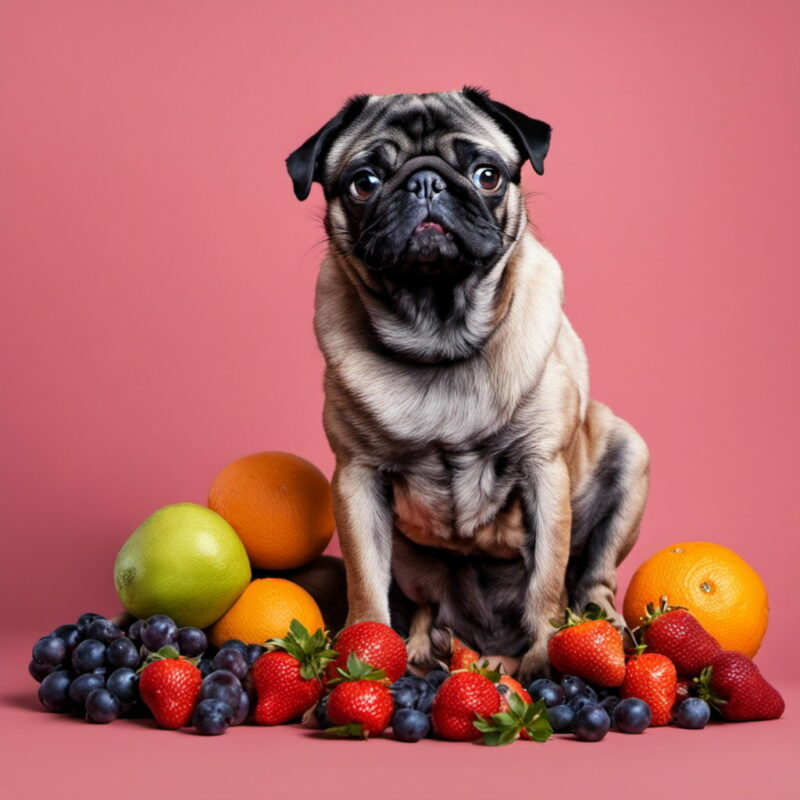
When it comes to feeding your dog, you probably want to provide a well-rounded diet that includes a variety of foods. Fruits can be an excellent addition to your pup’s menu, offering them natural sweetness and numerous health benefits. In this section, we’ll discuss how dogs perceive fruits and how to incorporate them into your dog’s diet.
Dogs have a different sense of taste compared to humans. While they can enjoy sweetness, their taste buds are less sensitive than ours. Nevertheless, many dogs still find fruits appealing, especially those with a sweet flavor profile, such as berries. When introducing fruits to your dog, start with small amounts and observe their reaction. If they enjoy the taste, you can gradually incorporate more into their diet.
It’s important to note that not all fruits are suitable for dogs. Some can be toxic and should be avoided, such as grapes and raisins. Others, like kiwi, are safe and even beneficial for them. For example, kiwi is a nutrient-dense fruit that contains vitamin C, fiber, and potassium, making it a great addition to your dog’s diet.
When incorporating fruits into your dog’s meals, moderation is key. While fruits are generally healthy, they can be high in natural sugars, which should not be consumed excessively. Instead, use them as occasional treats or mix small amounts into your dog’s regular food.
In summary, fruits can be a valuable addition to your dog’s diet, offering a variety of health benefits along with their natural sweetness. Be sure to choose dog-friendly fruits, such as kiwi, and remember always to introduce them in moderation.
Defining the Nature of Kiwi
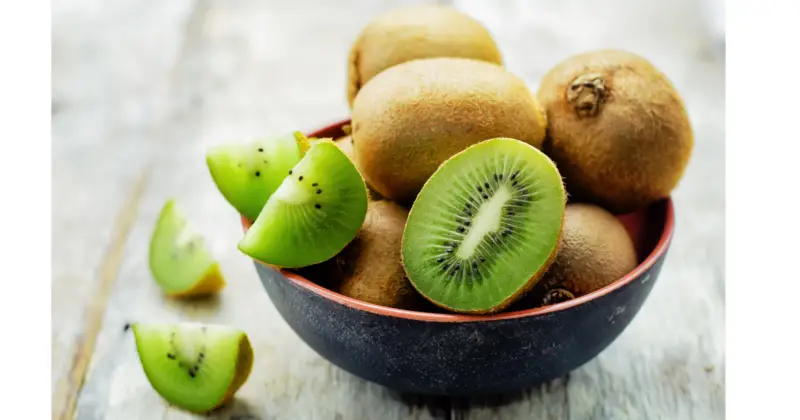
Kiwi is a fruit known for its unique appearance and distinct taste. When you think of kiwis, you might imagine the small, brown, fuzzy outer skin that encases the vibrant green and slightly tart flesh inside. This fruit, also called kiwifruit, has a ripe and juicy texture that is quite popular among fruit lovers.
When selecting kiwis, choosing the ones that are slightly soft to the touch but not overly mushy is essential. A ripe kiwi will yield under gentle pressure, while a too firm fruit might not yet be ready to eat and could taste more tart than desired. On the other hand, a fruit that is too soft might be overripe and could have lost some of its nutritional value.
Within this fascinating fruit, the green flesh is speckled with small, black seeds that are entirely edible. People often enjoy eating kiwi in various forms, such as sliced, blended into smoothies, or even scooped straight out of the skin with a spoon. The tart flavor of kiwi can be a refreshing and delicious treat that complements many dishes and adds a pop of color to your plate.
Despite its fuzzy and somewhat intimidating appearance, the kiwi’s outer skin is also edible. Some individuals prefer to enjoy the entire kiwi with the skin on, as it provides extra fiber and nutrients. However, washing the kiwi thoroughly before consuming it is crucial, as the skin may have dirt or pesticides on it. If you prefer not to eat the skin, simply peel the brown fuzz away before enjoying the fruit.
Now that you have a better understanding of the nature of kiwi, it can be useful to know how this tropical fruit might fit into your pug’s diet.
Can Pugs Eat Kiwi? Watch this
Nutritional Benefits of Kiwi for Pugs
Kiwi is a nutrient-dense fruit that can provide various nutritional benefits for your pug. It is packed with vitamin C, containing more of this essential nutrient than oranges. Vitamin C supports immune system functions and protects against free radicals.
In addition to its high vitamin C content, kiwi also contains more potassium than bananas. Potassium is vital in maintaining your pug’s overall health, as it helps regulate fluid balance and muscle contractions and supports proper nerve function.
Another important nutritional aspect of kiwi is its fiber content. Fiber is essential for maintaining your pug’s gastrointestinal health, preventing constipation, and contributing to healthy digestion.
Apart from these primary nutrients, kiwi also contains some amounts of vitamins A and calcium. While not as abundant as vitamin C or potassium, these nutrients still contribute positively to your pug’s overall well-being. Vitamin A is essential for maintaining healthy eyesight and skin, while calcium is necessary for maintaining strong bones and teeth.
The water content of kiwi is also worth mentioning, as it can help keep your pug hydrated. Water is a crucial component of your pug’s diet, especially during warmer months when they can be prone to overheating.
When incorporating kiwi into your pug’s diet, make sure to offer it in moderation and remove the skin and seeds before serving. The skin can be tough for pugs to digest, while the seeds can pose a choking hazard. A few bite-sized pieces or thin slices of kiwi can provide a tasty and nutritious treat for your pug to enjoy.
Is Kiwi Safe for Pugs?
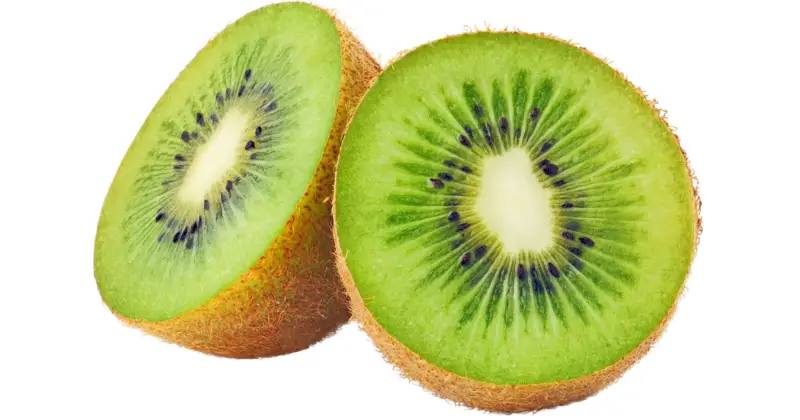
Yes, kiwi is generally safe for pugs to eat. This fruit provides many health benefits, such as vitamin C, fiber, beta-carotene, and potassium 1. In fact, kiwis contain more vitamin C than oranges and more potassium than bananas2. However, taking some precautions before letting your pug enjoy this nutritious fruit is essential.
Firstly, ensure that the kiwi skin is removed, as it may be difficult for pugs to digest and could present a choking hazard3. Moreover, the skin might contain pesticides and other chemicals that might be harmful to your pug4.
Removing the kiwi seeds before feeding them to your pug is also a good idea, as they can create a choking hazard, especially for smaller dogs5. In addition to removing the skin and seeds, cut the kiwi into small, bite-sized pieces to further reduce the risk of choking6.
Keep in mind that while kiwi is safe for most pugs, some dogs may have an allergy to this fruit7. Introduce kiwi to your pug’s diet in small quantities to monitor for any adverse reactions, such as itching or gastrointestinal distress.
As a pet owner, feeding your pug a well-balanced diet of high-quality commercial dog food is essential, as it contains all the necessary vitamins and nutrients that your dog needs8. Treats like kiwi should only be given occasionally and in moderation.
How to Prepare Kiwi for Pugs
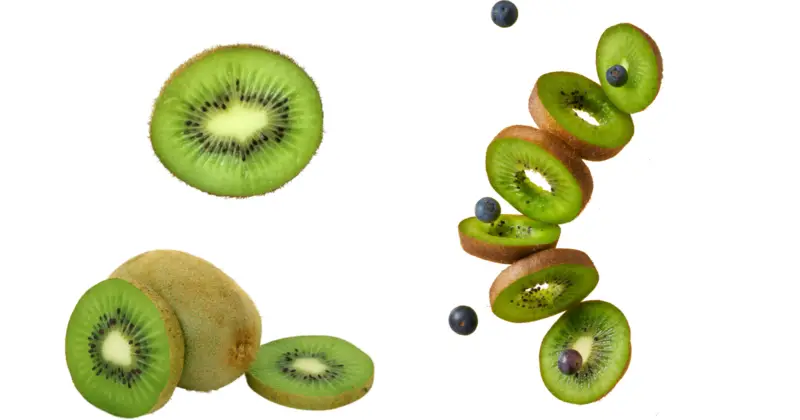
Feeding your pug a kiwi can be a healthy and delicious treat, but there is a proper way to prepare it to ensure the safety and enjoyment of your furry friend. First, begin by thoroughly washing the kiwi to remove any dirt or pesticides. This step is crucial to maintain the cleanliness of your pug’s food, just as you would for your own.
Next, peel the kiwi skin off so that only the flesh of the fruit is left. Though the kiwi skin contains insoluble fiber that could be beneficial for digestion, it might be too tough for your pug to chew and digest safely. It’s better to remove the skin and focus on providing nutrition from the flesh of the fruit.
Once the skin is removed, proceed with dicing the fruit into small, bite-sized pieces to reduce the risk of choking. Pugs, being a smaller and brachycephalic breed, may have difficulty swallowing larger pieces, so it’s important to ensure that the kiwi is cut into sizes that are easy for them to handle and consume.
When preparing the kiwi, note any kiwi seeds in the fruit. While these seeds are generally not harmful, it is advisable to remove them if it’s convenient to do so. However, a few seeds ingested by your pug will likely not cause any issues.
Now that your pug’s kiwi treat is prepared be mindful of serving size. Start by feeding your pug just a few bite-sized pieces, watching for any signs of upset stomach or allergies. As with any new food, it’s essential to gradually introduce it to your pug’s diet and monitor their reaction to ensure their well-being.
Dos and Don’ts When Feeding Kiwi to Pugs
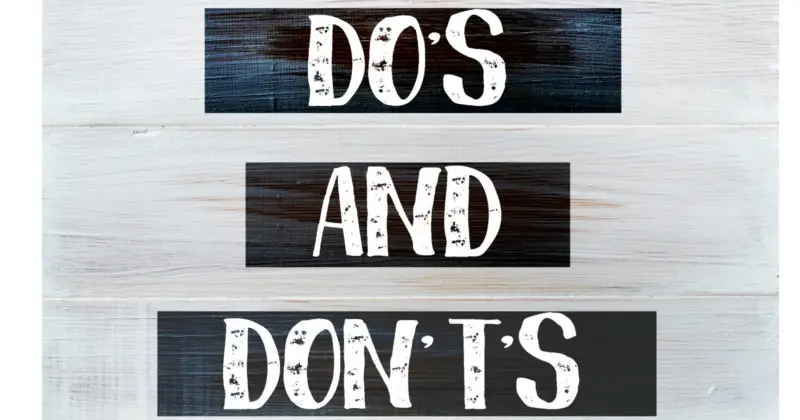
Dos When Feeding Kiwi
- Wash and peel the kiwi: Ensure that you thoroughly wash it before feeding it to your pug to get rid of any dirt or chemicals on the fruit’s surface. Then, remove the skin, as it might be difficult for a pug to digest 1.
- Slice it into small pieces: By cutting the kiwi into bite-sized portions, you’ll avoid any potential choking hazards 2.
- Serve in moderation: While kiwi is safe for pugs to eat, ensure you provide it in limited amounts. Feeding too much kiwi could lead to digestive issues 3. A few pieces of kiwi once in a while can be a healthy treat.
- Monitor your pug’s reaction: Every dog is different, so observing your pug for any adverse reactions when consuming kiwi for the first time is essential. Some dogs might have allergies or sensitivities to specific fruits 4.
Don’ts When Feeding Kiwi
- Never feed whole kiwi or large pieces: Avoid giving your pug a whole kiwi or large chunks of the fruit, as it may pose a choking hazard.
- Do not replace a balanced diet: Kiwi should be served as an occasional treat and not replace your pugs’ regular dog food. A well-balanced dog food diet will provide all the essential nutrients your pug needs to stay healthy 5.
- Don’t overfeed kiwi: Remember, moderation is key when it comes to feeding your pug kiwi. Too much of this fruit may cause stomach upset or diarrhea 6.
In conclusion, feeding kiwi to your pug can provide benefits such as vitamin C, fiber, beta-carotene, and potassium 7. By following these dos and don’ts, you can ensure your pug enjoys this tasty treat safely and responsibly.
Other Fruits Safe for Pugs
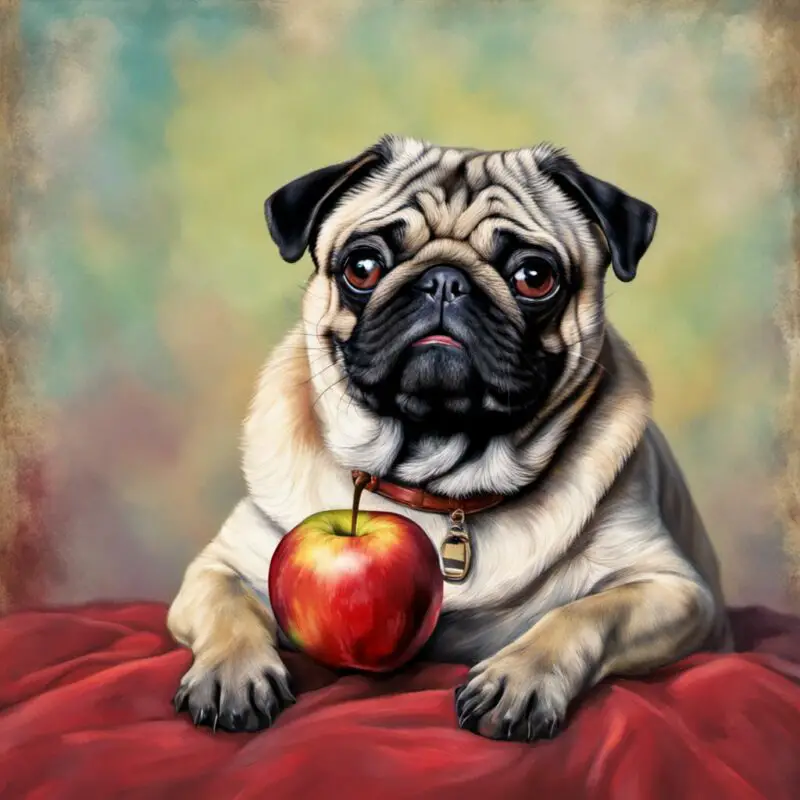
In addition to kiwi, there are several other fruits that are safe and beneficial for your Pug to enjoy. Each fruit provides a range of nutrients that can contribute to your dog’s overall well-being. It is always essential to provide these fruits in moderation and remove any seeds or inedible parts before feeding them to your Pug.
Apples are an excellent choice for Pugs, as they’re a great source of vitamins A and C and fiber. Make sure to remove the seeds and core first, but don’t worry about the skin—your Pug can digest it just fine.
Bananas are another safe fruit for Pugs that can be given in moderation. They contain essential nutrients like potassium, vitamin C, and fiber. While kiwi has more potassium than bananas, having a variety of fruits in your Pug’s diet can be beneficial.
Oranges can be a healthy treat for your Pug, as they’re rich in vitamin C and other nutrients. However, removing the seeds and peeling them before offering them to your Pug is important, as these parts can be difficult for them to digest.
If you have pears at home, your Pug can also safely enjoy them. Just like apples, pears offer a good amount of vitamins and fiber. Always remove the seeds and core before giving them to your pup.
Mango makes a delicious treat for Pugs, and it’s packed with vitamins A, and C. Remember to remove the skin and pit before serving this tropical fruit to your canine companion.
Watermelon is an excellent choice, especially on hot sunny days. It is low in calories and high in water content, which will help keep your Pug hydrated. Just make sure to remove the seeds and rind before serving it.
Your Pug can also enjoy raspberries, an antioxidant-rich fruit with anti-inflammatory properties. However, feed them in moderation, as they contain small amounts of sugar and xylitol, which can be harmful in large amounts.
Pineapple is another tropical fruit that is safe for your Pug to enjoy. Make sure to remove the skin and core, then offer your dog small, bite-sized pieces.
Cantaloupe is also a safe and hydrating fruit for Pugs, offering dietary fiber, vitamins, and potassium. Serve it in small, seedless pieces for a tasty treat your Pug can enjoy on a warm day.
Lastly, blueberries are a great source of antioxidants and can be safely included in your Pug’s diet. They make for a delicious, bite-sized snack that provides several health benefits.
Remember always to monitor your Pug’s reaction to new fruits and consult your veterinarian if you have any concerns about their diet.
Potential Risks of Feeding Fruits to Pugs
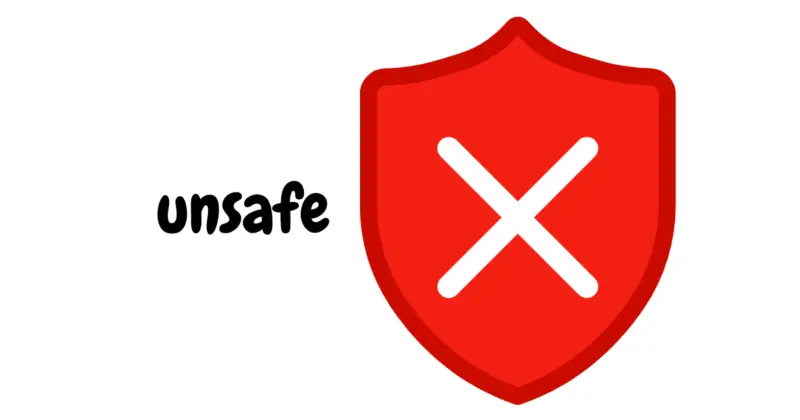
Feeding fruits to your pug can be a healthy addition to their diet, considering they provide essential vitamins and minerals. However, there are some potential risks to be aware of when introducing fruits into your pug’s diet.
Firstly, choke hazards can be a concern with certain types of fruits. Some fruits contain seeds or pits that can pose a choking risk or cause intestinal blockage in your pug. Before offering fruit to your pug, always make sure to remove any seeds or pits and cut the fruit into small, manageable pieces suitable for their size.
Allergies and intolerance are also factors to consider when feeding fruits to your pug. Like humans, pugs can develop allergies or intolerance to certain fruits. To avoid potential issues, gradually introduce new fruits to your pug’s diet and observe any reactions or changes in their behavior or health. If you notice any signs of allergies or intolerance, such as itching, vomiting, or diarrhea, discontinue the fruit and consult your veterinarian.
Overindulging in fruits can lead to overweight or obesity in your pug. Fruits contain natural sugars and calories, which can contribute to weight gain if consumed in large amounts. To maintain a healthy weight for your pug, offer fruits as occasional treats rather than a primary food source.
Lastly, be aware of poisonous fruits that can be harmful to your dog. Some fruits, like grapes and raisins, can cause kidney failure in dogs, while others can be toxic when ingested in large amounts. To keep your pug safe, always research any fruit you wish to include in their diet and ensure it is safe for canine consumption.
By taking these precautions and being mindful of potential risks, you can safely incorporate fruits into your pug’s diet and provide them with the benefits that these nutritious treats offer.
Conclusion: Can Pugs Eat Kiwi
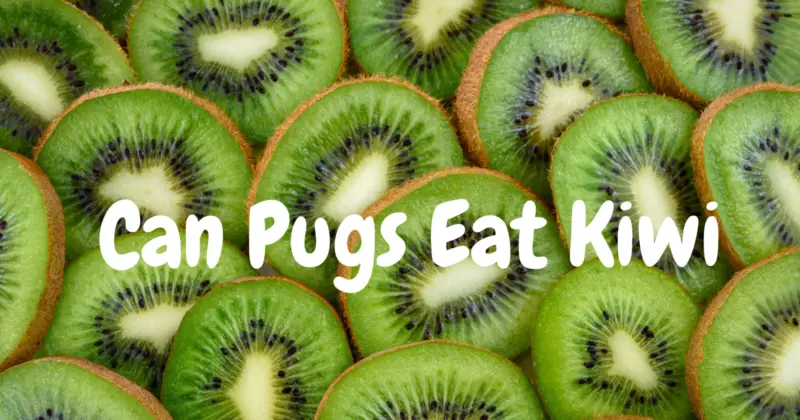
In summary, it is safe for your pug to eat a small amount of kiwi as an occasional treat. However, it’s essential to remember that dogs do not have the same nutritional requirements as humans. Kiwi can provide some health benefits for your pug, such as the insoluble fiber in the fruit’s skin for their digestion.
When introducing kiwi to your pug, make sure to peel and dice the fruit into small, manageable pieces. Keep the serving size limited, as consuming too much kiwi may cause issues like diarrhea or an upset stomach.
While kiwi can be a refreshing and enjoyable treat for your pug, it should not replace their regular diet. Focus on feeding your dog a nutritionally balanced diet tailored to their needs, like the Royal Canin Breed Health Nutrition Pug Dry Dog Food, which is specifically designed for purebred pugs aged 10 months and up.
In conclusion, feel confident in offering your pug a taste of kiwi as a treat every now and then. Just be mindful of portion sizes and always provide them with a balanced diet to ensure their overall health and well-being.
Frequently Asked Questions
Is kiwi safe for pugs to consume?
Yes, kiwi is safe for pugs to consume as long as they are not allergic to the fruit. In fact, kiwi is a good source of vitamin C, fiber, beta-carotene, and potassium for your pug. It is important to remember that just like with any other fruit, moderation is key. Make sure to remove the skin and seeds before feeding kiwi to your pug. Here’s more information about kiwi and pugs.
Can pugs digest kiwi skin?
Is kiwi safe for pugs to consume?
Yes, kiwi is safe for pugs to consume as long as they are not allergic to the fruit. In fact, kiwi is a good source of vitamin C, fiber, beta-carotene, and potassium for your pug. It is important to remember that just like with any other fruit, moderation is key. Make sure to remove the skin and seeds before feeding kiwi to your pug. Here’s more information about kiwi and pugs.
Are golden kiwifruits suitable for dogs?
Yes, golden kiwifruits are also safe for dogs to consume. Like green kiwis, they provide various health benefits due to their high content of vitamins, minerals, and antioxidants. Just make sure to peel and remove the seeds before feeding your pug any type of kiwi fruit.
What amount of kiwi can a pug eat?
Moderation is essential when feeding your pug kiwi. Offering them small pieces occasionally is enough for a healthy treat without causing digestive issues. It is always a good idea to consult with your veterinarian to determine the appropriate amount of kiwi for your pug based on their size, weight, and overall health.
Do kiwi seeds pose a threat to pugs?
While kiwi seeds are not toxic to pugs, it is still advisable to remove them before feeding the fruit to your pet. Kiwi seeds are quite small and should pose minimal risk, but removing them can prevent any potential choking hazards or digestive problems.
Can pugs have other fruits like strawberries and papaya?
Yes, pugs can have other fruits like strawberries and papaya, provided that they are not allergic. These fruits offer various health benefits for your pug as they are high in vitamins, minerals, and antioxidants. As with kiwi, always remember to serve these fruits in moderation and remove any inedible or hazardous parts, like seeds or pits, before offering them to your pug.


